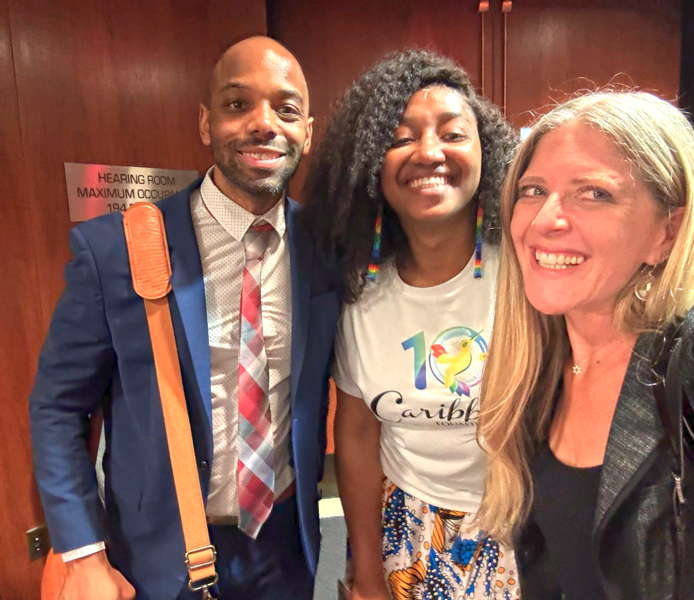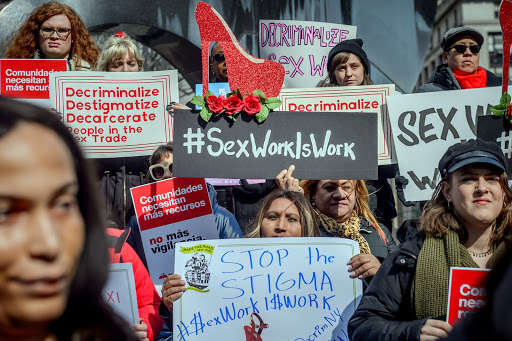May 15, 2025
If The Goal Is Safety:
Examining The Laws Needed to Protect Sex Workers and Trafficking Survivors Who Report Crime
By Isidoro Rodriguez, Freelance Writer
Laura Mullen was trafficked for sex twice in her life. The first time was at the hands of her own family.
“My brother was a drug dealer, and he sold me when I was 12 years old,” said Mullen.
The second time, over a decade later, was by a man who took advantage of her poverty and her struggle with addiction to ensnare and control her.
“He offered me a shower, something to eat, and crack,” said Mullen.
“He ended up telling me I owed him for everything he gave me.”
Then, one night in 2016, Mullen and her trafficker were pulled over by the police while on their way to a motel in Long Island. But even though the opportunity was right there, she says she never even considered asking the cops for help.
“My trafficker had a gun on him; he had lots of drugs that we were taking to that motel to bag and sell, and I was being trafficked,” said Mullen.
“I was in bondage, but my biggest fear was going to the cops.”
Mullen, now co-founder of the Survivor Advisory Board, a Long Island-based advocacy and support group aimed at ending human trafficking, says that her experience exemplifies the hard choice and consequences that both consensual sex workers and victims of human trafficking face every day.
“I was so scared of being criminalized and arrested that night that I didn’t say anything. The police never looked into my trafficker, and he got away,” said Mullen.
She says that if there had been an immunity law to protect her from arrest and prosecution for engaging in prostitution this would not have happened.
Immunity laws are similar to good samaritan laws, which grant limited protection from criminal liability to people if they have or witness a drug or alcohol overdose.
But while, as of 2024, good samaritan laws are available in 48 states and the District of Columbia, only nine have adopted immunity laws to protect sex workers and trafficking victims who report crimes.
Without them, safety and justice are withheld from sex workers and sex trafficking victims around the country because they genuinely fear reporting often-violent crimes to law enforcement.
“Immunity laws help get the people that need to be off the streets off of the streets because the women and men who are doing this work can report the horrific crimes that are occurring without fear,” said Mullen.
A 2020 study found that 31 percent of sex workers do not report crimes to police because of their own current and comparable criminalization framework. A 2022 systematic review of empirical research from 2012-2017 found that, in general, sex workers experience low levels of trust in the police, which results in unwillingness to report their victimization.
Melissa Sontag-Broudo, Legal Director for Decriminalize Sex Work, a national organization fighting to end the prohibition of consensual adult prostitution in the United States, says that immunity laws are a critical step to protecting a community that has never felt safe enough to seek help despite being the target of violence for centuries.
“You can go as far back as Jack the Ripper to know that serial predators target sex workers because they know they can’t go to the police,” said Sontag-Broudo, referring to the English serial killer who murdered at least five sex workers in the East End of London in 1888.
In the United States, Gary Ridgway, the Green River killer, was convicted of 49 killings in Washington state and stated in 2003 that he chose sex workers as victims because he knew no one would miss them quickly, if at all. Most recently, Rex Heuerman, the Gilgo Beach Killer, was charged with the killings of seven women, many of them also sex workers, and is suspected of killing even more.
One 2014 study found that, globally, sex workers have a 45-75 percent chance of experiencing sexual violence on the job, while another study in 2016 said that women who sell sex are 18 times more likely to be murdered than women who don’t. The Urban Justice Center reports that sex workers of color, migrant sex workers, and transgender sex workers experience an even greater risk of sexual violence and assault.
“If we know that somebody’s going to [keep preying on] the same community, we need to support that community and empower them to be able to report things that they see or experience,” said Sontag-Broudo.
“It’s a straightforward solution.”
But Blair Hopkins, Executive Director of Sex Workers Behind Bars (SWOP), a grassroots organization aiding and supporting sex trafficking victims and sex workers in and out of prison or jail, says that there is still a long way to go before the justice system, particularly the police, truly understand why immunity laws are necessary to combat trafficking and other violent crimes.
“There’s some inertia and lack of creativity from the law enforcement perspective,” said Hopkins.
“It makes the conscious choice not to be equipped for dealing with people who enter the sex trade.”
A 2021 report by the USC Gould International Human Rights Clinic found that anti-sex trafficking operations identify few victims or traffickers and instead frequently arrest both victims and consenting sex workers; that police regularly traumatize, criminalize, doubt, blame, and misgender suspected victims; and that operations fail to result in the prosecution of traffickers, address factors that make people vulnerable to being trafficked, or connect survivors with the short and long-term services they need.
A 2020 report by the Yale Global Health Justice Partnership and the Sex Workers and Allies Network, a New Haven-based harm reduction and advocacy group, revealed from a survey of 49 of its members that 66 percent reported having felt unsafe during interactions with police, 83 percent reported having felt disrespected or stigmatized by the police, and 73 percent of those who were directed to a service provider by the police reported that this happened under threat of consequence.
Alex Andrews, co-founder of SWOP Behind Bars, argues that these kinds of experiences are some of the main reasons that predators like José Olivio Torres, the serial rapist known as Joey the Player, and recently sentenced to 30 years in prison for sexually assaulting at least 30 sex workers and possibly hundreds more, can get away with their crimes for so long.
“Over 200 [sex workers] tried to report the violence against them [by Torres] to local law enforcement in New Jersey, Boston, New York, and Canada, and they were ignored,” said Andrews.
“One who reported in New Jersey was even threatened with arrest.”
It’s a prejudiced and dehumanizing response that Mullen says greatly benefited her trafficker the night they were stopped.
“The cops who pulled us over thought I was ‘just a prostitute,’ they assumed I wasn’t being forced, and they actually warned my trafficker about being with me,” said Mullen.
“Just because my trafficker drove a BMW and looked straight-edge, they saw me as the bad person, and he got away.”
And without the protections that access to immunity laws can provide, Hopkins, who also directs a network of allies to bail out people arrested on prostitution charges, warns that encounters between people like Mullen and the police can be much worse.
“Being ignored by law enforcement when a sex worker or trafficking victim reports their assault is the best case scenario under the existing legal framework [in most states],” said Hopkins.
“The worst case scenario is that when survivors and victims come forward, the police then target, extort, and exploit them.”
A 2022 survey found that out of 360 people who engaged in consensual sex work over five years, nearly half (49.7 percent) of participants experienced some form of police misconduct, including demanding money (25.9 percent) and sex (17.6 percent). Roughly one in six sex workers (15.9 percent) also reported it being common for police to take participants’ phones to use for “sting” operations to arrest customers.
In a 2023 survey of 308 sex workers in Baltimore, Maryland, between 72 percent and 85 percent had been solicited for paid sex by uniformed police; between 41 percent and 50 percent of women who reported recent sex with police indicated they had done so because they feared arrest otherwise; and one-third were directly pressured for sex by police to avoid arrest or trouble.
“We need to acknowledge that, at the end of the day, while the cops think they’re the good guys, they’re just not,” said Andrews.
Amy-Marie Merrell, Co-Executive Director of The Cupcake Girls, a sex-trafficking victims and sex workers aide and advocacy group, says that the ongoing and mainstream stigma and prejudice that sex workers and trafficking victims encounter every day precipitates their exploitation and lack of access to legal rights and protections.
“Our communities and our society have decided that [sex workers and sex trafficking victims] are less than human, that they’re not productive in society, and that they’re involved in criminal activity, so why help them?” said Merrell.
The public commonly blames sex workers for the breakdown of the traditional family, sexually transmitted infections (but especially HIV/AIDS), escalating crime in urban areas (especially crimes related to drugs), and the subversion of youth.
In 2010, New York public school teacher Melissa Petro was charged with conduct “unbecoming a teacher” for merely writing about her prior sex work experience, while as recently as 2023, a Texas mother was fired from her job as a sex education instructor after being exposed as a sex worker.
“As a society, we’re not seeing enough people stepping up and legitimizing and humanizing folks in the sex industry who all deserve access to justice,” said Merrell.
“The people that get that justice are the people that are the most humanized in our society right now.”
A 2016 nationwide poll found that roughly 57 percent of the nearly 1000 participants believed that both paying for and accepting money for sex was morally wrong, with almost 83 percent agreeing that engaging in either deserved some form of punishment. The American Academy of Pediatrics reports that stigmatization of sex-trafficking victims is common and expressed in victim blaming, ostracization by the family and home community, and victim shaming.
“People don’t want to be associated with sex work in a positive light,” said Andrews.
“And it is hindering safety.”
For Kaytlin Bailey, Founder and Executive Director of Old Pros, a nonprofit media organization that utilizes storytelling to advocate for the rights of sex workers, the problem boils down to a lack of education and awareness.
“Prejudice is born of ignorance, and we all get this cultural conditioning [about sex workers and sex trafficking]…, so it’s tough for the people to understand a more complex story,” said Bailey, also a former sex worker.
In general, the public receives only conflicting and confusing information about the realities of sex trafficking, believing if a person initially consents to their situation, they are not being trafficked in the first place or understanding it as a solely snatch-and-grab scenario perpetrated by strangers who use physical force to imprison victims just waiting for the opportunity to cry for help.
The popularized narrative of sex trafficking fails to include the reality that perpetrators are often people close to the victim who rely on coercion and manipulation over force, that initial consent is irrelevant when considering these factors, and that victims are often too afraid to ask for help if and when the opportunity presents itself.
That ignorance and confusion persist when it comes to the realities of consensual sex work as well, and the absence of understanding of either leads to a lack of empathy.
“Even when dealing with a serial killer or a rapist, or a very violent crime, I think it’s challenging for the general public to understand that even those crimes are simply not taken as seriously when the victim is a sex worker,” said Bailey.
This dilemma not only impedes understanding and empathy for the complex realities of sex work and sex trafficking but also elicits doubt about the need for immunity laws to protect these communities at all.
“The fact that we would need to create these rights protections around this historically stigmatized, criminalized, and marginalized class rubs people the wrong way,” said Bailey.
The ongoing debate over sex work’s status in the United States legal system only further exacerbates the issue.
In the United States, sex work/prostitution, the act of exchanging sexual activity for money, is prohibited/criminalized in almost all states. In Nevada, it is legal in specific counties. In 2023, Maine became the first state to adopt the Nordic or end-demand model, which eliminates criminal charges for sex workers while still criminalizing those who pay for sex services or engage in the trafficking of sex workers.
Some advocates and academics, as well as former trafficking victims, say sex work is inherently exploitative and violent and, as a result, that there is no such thing as consensual sex work, and that there are only prostituted people and trafficking victims who need a way out of “the life.” They insist that the Nordic model is the best way to protect sex workers and sex trafficking victims and provide them with access to aid and escape.
Others argue that the distinction between sex work and sex trafficking comes down to consent, that people should be free to engage in sex work safely if they so choose, and that full decriminalization is the only way forward. Advocates for full decriminalization further state that violence against sex workers is not inherent to the work but is precipitated and exacerbated by criminalization.
Today, in the United States, most groups are advocating for either the Nordic model, as seen in Maine, or full decriminalization, as is the case in New Zealand and parts of Australia.
Immunity for sex workers and trafficking victims who report crimes is a part of both models.
“These types of immunity statutes are critical to centering and protecting the most vulnerable people in the sex trade,” said Yasmin Vafa, executive director of Rights4Girls, a nonprofit organization advocating for the rights and safety of young women and girls.
“What ends up causing controversy with these bills is how broad their scope is.”
Vafa, whose organization helped with Maine’s adoption of the Nordic model, and sex-trafficking survivors warn that some immunity laws could be protecting the wrong people: clients.
“Buyers were the ones that I would set agreements or rules up with, but almost always those rules or agreements were broken, and even if I said no, it never mattered,” said Audra Doody, a sex trafficking survivor.
“I had guns pulled on me, I was held down and physically raped, and no one ever saw me as a human being.”
Co-Executive Director of the Safe Exit Initiative, a sex trafficking survivors support and advocacy organization, Doody says that, while she did encounter buyers who respected her boundaries, they were not the majority and that even those so-called good ones failed her in the end.
“There were times that I was beaten so badly that I couldn’t open one of my eyes, that my body was covered in bruises, and not one [buyer] ever asked me if I was okay, if I didn’t want to be there, or if I was safe,” said Doody.
“They just didn’t care.”
Alina Bluto, Senior Director of Programs and Engagement with Safe Exit Initiative and another sex trafficking survivor, had similar experiences.
“I would say I didn’t want to do something, but because I needed the money, or the drugs, or whatever it was at that time, I would always bend, and that line in the sand would move further and further away,” said Bluto.
“Somebody always used some type of coercion, and I ended up exchanging a piece of myself to these men that I did not want to be involved with.”
A new report from Rights4Girls, examining sex buyers’ behavior and culture based on roughly 95 buyers’ recorded posts and conversations around the country on online platforms, found that postings often revealed sex buyers as being fully aware and indifferent to signs of trafficking, coercion, exploitation, violence, desperation, or substance abuse. Buyers also expressed objectification and commodification of women they purchased or solicited and displayed racism or fetishization of sex workers.
“The sex trade is inherently violent, and he who holds the money makes the rules,” said Bluto.
A 2023 analysis of homicide data from the National Violent Death Reporting System (NVDRS) covering 49 US states, the District of Columbia, and Puerto Rico from 2012 to 2020 reports that, out of the 321 sex work-related homicides recorded, 88 of roughly 163 female victims’ suspected perpetrators were clients.
In Phoenix, Arizona, in 2011, 37 percent of 465 individuals who entered a prostitution diversion program reported being raped by a client, while a 2010 study found that 34 percent of 562 Miami-based female sex workers experienced violent encounters with clients within 90 days of their interviews with researchers.
Vafa argues that potentially placing buyers under the protection of immunity laws only adds to an already dangerous precedent.
“These are individuals who very often are not charged to begin with, simply because of the culture of impunity that exists around sex buying,” said Vafa.
A 2020 report on commercial sexual exploitation in Pennsylvania found that 70 percent of prostitution arrests are for selling sex, while only 30 percent of arrests are for purchasing sex. Another report found that by 2017, arrests in Chicago for sellers in prostitution were up 90 percent from 70 percent in 2013. A 2019 analysis of FBI crime statistics found that 70 percent of the 4,715 prostitution-related arrests by New Jersey law enforcement agencies from 2012 through 2016 were of the women selling sex vs the men buying it.
“[Sex workers and trafficking victims] are the ones who need legal protections because they are the ones who face the bulk of the violence, most of which is being inflicted by the men who are purchasing and selling them,” said Vafa.
However, a 2024 study examining the effects of criminalization of sex work clients in Sweden found that doing so actually increased the number of rapes of sex workers by approximately 44-62 percent. A 2018 systematic review of 134 studies done around the globe between 1990 and 2018 found that criminalization, in general, increased the risk of sexual and physical violence from clients or other parties, condomless sex, and police violence and abuse.
Kaytlin Bailey argues that the narrative that clients are, at best, ambivalent to the plight of these communities or, at worst, inherently predatory and therefore do not deserve the protection of immunity laws misrepresents a more complex reality.
“We must be able to distinguish between people that work with sex workers and people that exploit, rape, assault, and rob sex workers,” said Bailey.
“Because those people are not our clients; they are people posing as clients to commit crimes against us.”
Jessie Sage, a writer, sex worker’s rights advocate, and veteran sex worker based in Pennsylvania, agrees, saying that her clients have been a variety of everyday people with differing and safe reasons for employing her services.
“I work with a lot of autistic clients who come to me because they don’t have a lot of experience, or they’re socially awkward and aren’t sure how to go about dating, and what I do is almost like dating coaching,” said Sage.
“Many of my clients I’ve seen for four or five years, and they’re pretty long-term relationships that just look like dating: we go out to dinner, we have some coffee, we meet at a bar or restaurant, and then just spend some time together.”
In her 2024 article for Pittsburgh City Paper, Sage highlights multiple other positive experiences with clients, including one who paid for her lawn service when she needed it, another who booked a session with her so that he could experience tender touch, another who was a carpenter and remodeled part of her home, and another who covered all of the expenses (including childcare expenses) for her to go to a writing retreat.
“I wouldn’t use the term predator for any of the clients that I’ve had,” said Sage.
“These are adults that are entering into consensual transactions with sex workers who are there for their reasons, and I don’t think that there’s anything about that in and of itself that makes them problematic.”
Her perspective and experience are similar to that of other members of her profession.
“Almost all of my experiences with my clients have been positive and often not even sex-focused,” said DW, an independent sex worker since 2018 (name changed for privacy concerns).
“They’re people who are looking to date casually, who want to learn how to date, someone whose wife has died and isn’t ready to start again, and they all want to hire someone to meet those needs that all people have.”
A study examining the experiences of 47 predominately racialized sex workers and third parties working in indoor environments in Canada between 2017 and 2018 found participants highlighted that the majority of their client interactions were positive. Another study involving indoor sex workers found that 68 percent of participants (74 of 109) reported experiencing no violence in their work at all.
“To treat a reasonable, polite, regular client of an adult, consensual sex worker like a violent predator would be akin to being unable to distinguish between somebody purchasing alcohol from a store that sells alcohol and somebody holding up a liquor store because they walked in there pretending to be a customer,” said Bailey.
“A client has a question or a request. A predator has a demand,” said DW.
“Criminalizing clients is not going to make anybody safer, and a predator pretending to be clients is going to continue to remain empowered to assault, attack, berate, and stalk sex workers.”
Jessie Sage also warns that criminalizing clients like this can have the opposite effect than intended, actually making it more dangerous for people in her profession to operate safely.
“Sex workers will often ask for screening information from clients, like driver’s licenses, dates of birth, a phone number connected to a real phone, a LinkedIn profile, things that we can cross-check with blacklists put together by other sex workers, as well as check for a criminal record, to make sure they’re not a violent offender,” said Sage.
“These are very standard protocols that, right now, clients feel like they have to abide by, but when clients feel like they’re in jeopardy in terms of the law, they’re going to be far less likely to hand over any of the information we use to guarantee our safety.”
“The goal should be to create a safer environment for everyone involved in consensual exchanges while holding predators accountable,” said Brooklyn Stokely, an independent sex worker and sex worker’s rights advocate based in southern California.
“Criminalizing clients forces me to meet in unsafe places or skip screening steps and creates an environment where predators, including law enforcement using entrapment tactics, have even more power over us.”
A 2020 report from the ACLU found that criminalizing clients can often force sex workers into less safe working conditions where their boundaries are less likely to be respected, and they’ll face greater risks to their health and safety.
“Immunity should never shield predators who use their power to exploit us under the guise of being a client,” said Stokely.
“But if a client witnesses violence, trafficking or other serious crimes, and fears legal consequences for coming forward, that creates a chilling effect where crimes go unreported.”
A 2023 handbook released jointly by the Yale Global Health Justice Partnership (GHJP) and the Sex Workers Project (SWP) of the Urban Justice Center, focusing on District Attorneys (DA) ’s policies of non-prosecution of sex work-related charges, underscores the importance of not prosecuting… clients and third parties, stating that such policies encourage police surveillance, reduce sex worker safety, facilitate the arrest of sex workers on other charges, and enable the targeting of low-income men and men of color.
Among the nine states that have adopted sex work immunity laws, California, Utah, and Colorado currently include clients under the protections, with Alaska legislators recently considering the same. Nebraska, Massachusetts, and Rhode Island also included clients in immunity legislation introduced in 2022 and 2023.
But, despite the debate, the one thing that both sides do agree on is that if the goal is safety, immunity laws to protect sex workers and trafficking victims are needed in every state in the country.
“Even people that don’t support the full decriminalization of sex work are willing to stand with sex workers to fight for our most basic rights,” said Bailey.
“If you want to catch serial killers and serial rapists faster, help sex workers report crimes committed against us by offering us immunity from prosecution when we do so.”
In the last few years, seven states have attempted to implement immunity laws, with New York and Nevada introducing their legislation most recently this year. Meanwhile, a 2021 national survey found that 42 percent of registered voters are in favor of decriminalizing prostitution in some form, and Chicago could become the first state in the country to implement full decriminalization.
As a better understanding of the realities of the sex trade, respect for the humanity of those within it, and support for their fundamental right to safety and justice grows, the laws to protect them should follow.
“We are sisters, brothers, moms, and daughters,” said DW.
“We are people, and we deserve protection.”

DSW Newsletter #63 (May 2025)
DSW Lobbies for Immunity in Albany

Immunity in Depth

New Orleans Passes Immunity Legislation

Two Federal Bills Threaten Online Speech, Sex Work, and Digital Privacy

Sweden Bans Live Action Pornography, Expands Criminalization of Online Sex Work

